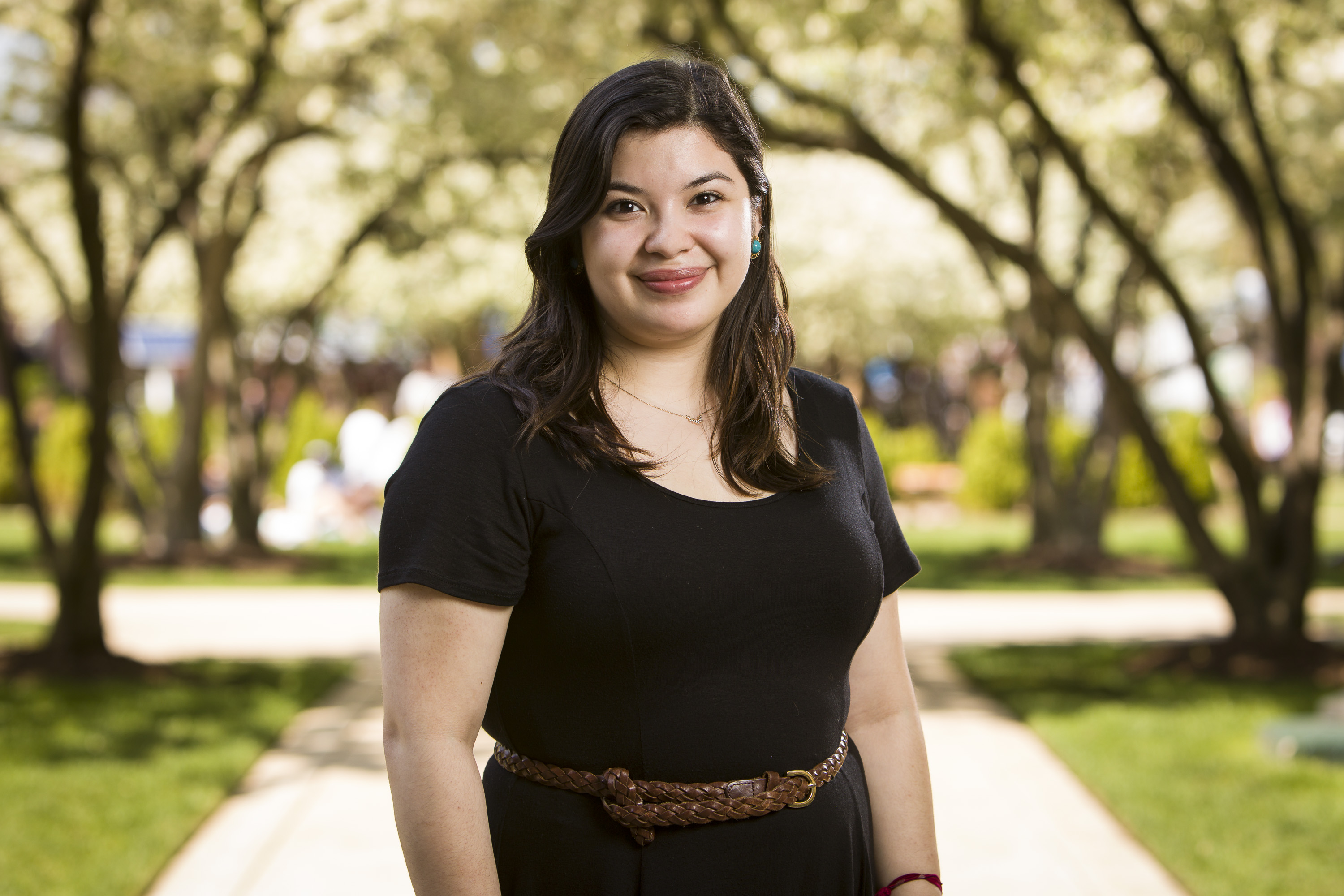 Bella Mucino, a psychology major in the College of Science and Health and native Chicagoan, knew she wanted to work in her community ever since volunteering in her mother’s Chicago Public Schools classroom. (DePaul University/Jeff Carrion)CHICAGO — Growing up in Chicago, Bella Mucino volunteered in her mother’s kindergarten classroom with bilingual students. Mucino could relate to the struggles young children face growing up in bilingual homes. “You always feel like you are behind in both languages, and I understood how they felt.”
Bella Mucino, a psychology major in the College of Science and Health and native Chicagoan, knew she wanted to work in her community ever since volunteering in her mother’s Chicago Public Schools classroom. (DePaul University/Jeff Carrion)CHICAGO — Growing up in Chicago, Bella Mucino volunteered in her mother’s kindergarten classroom with bilingual students. Mucino could relate to the struggles young children face growing up in bilingual homes. “You always feel like you are behind in both languages, and I understood how they felt.”
She also saw children struggling with trauma. “I witnessed a lot crime and violence in my neighborhood. Thankfully, I come from a protective family, so I was not as affected. But not many children have that,” said Mucino. This experience inspired her to focus on studying children and how they handle trauma. “I want to work to take the stigma away from mental health,” she said.
Mucino will graduate this June with a Bachelor of Arts from DePaul University’s College of Science and Health with a degree in psychology and a concentration in human services.
As a psychologist, Mucino wants to help children reach their full potential. “DePaul offers many great opportunities with professors, interesting classes and access to volunteering programs throughout the city,” she said. Coming to DePaul gave Mucino ways to continue to make a difference in her community.
Finding her place
During her freshman year, Mucino was struggling to find her place in the Department of Psychology. “I was in General Psychology and was losing interest. It was statistics and research-methods-based, and I wanted something more hands-on.”
Her advisor Elizabeth Jackson recommended the Peer Mentors Program for DePaul psychology students, which gives underclassman the opportunity to meet with seniors and receive advice and mentorship. The Peer Mentors Program exposed Mucino to the human services concentration, which includes social work, clinical and direct work with individuals in need. Mucino found it to be a perfect fit.
Four years later, Mucino served as secretary of the Peer Mentors Program, which she credits with helping her find the field she loves. “It is great to continue to help others find their place at DePaul,” said Mucino.
Backgrounds collide through mental health
Mucino comes from a family of teachers, and her decision to go into psychology was met with some opposition. “Coming from a Latino background, mental health is not something that is talked about. Going to a psychologist to talk about your problems is unusual,” she said.
She found mentorship in Antonio Polo, a fellow Latino and psychologist. “There are so few Latinos in psychology, it has been helpful to see someone with a similar background with success in the field,” said Mucino.
Polo leads the Culture and Evidence-Based Practice Lab in the DePaul Family and Community Services center in Lincoln Park. Mucino interned there and works with students from Chicago Public Schools on depression prevention and intervention techniques. She also worked in schools to help identify minority youth with mental health problems.
Research focus: Bullying among minority youth
To culminate four years of study, Mucino wrote an honors thesis on her work with the center. She examined whether parental warmth can act as a buffer for children in minority communities who are bullied at school.
“My findings were really interesting. Even if children have high parental involvement, if a child is bullied too much they will still express externalizing symptoms, for example, punching or kicking another student,” explained Mucino.
Mucino believes that there is an abundance of research on how children handle bullying internally through depression; however there is a little known about how children handle bullying externally. She also said there is not enough research on mental health issues in minority communities, and she wants to change that.
Since beginning this project, Mucino has been inspired to share her findings. “I recently presented my research at the Chicago Undergraduate Research Symposium, and later this quarter I will present at the college’s Psych Night.”
Looking ahead
In the future, Mucino plans to continue her focus on children affected by trauma and to pursue a master’s degree in social work. After graduation she plans to work in social services, or as a college admissions counselor to help other first-generation college students.
“DePaul has given me the confidence to go out into the world and help people. That is exactly why I went into psychology: so I could enact change,” she said.
###
Media Contact:
Kristin Claes Mathews
312-241-9856